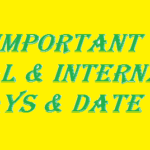1. Tell me about yourself :-
After greeting, shaking hands and introducing yourself, the next thing that interviewers are probably going to ask you to do is to talk about yourself.
Now, this might seem easy for you – you’ve practiced it in your English class so much, but they don’t want to hear every single detail. Avoid saying something like: I was born in Beijing. I love playing the computer and surfing the net. or I have two sisters. They don’t want to know everything about you. They want to know about you and your career growth; they want to know about you related to the job you’re applying for.
Also, make sure you don’t use any informal slag or make any basic grammar mistakes.
2. What are your strengths? :-
When your interviewer asks you this question, they want to know all your positive qualities. These positive qualities need to relate to what they want and are looking for.
So before you head into your interview, make sure you do your research as to what kind of person suits this job, especially if you’re a newbie (new) and entering the workforce for the first time. Treat this question as a chance to advertise yourself – you are the product, now market yourself. The thing to remember here is not to just list a number of adjectives (anyone can do this). Instead, use examples to support your point.
3. What are your weaknesses? :-
What? I don’t have any weaknesses! Of course you do – no one’s perfect. Everyone has weaknesses, but what they’re checking for here is how you try to fix your weaknesses and they also want to know how self-aware (how much you know about yourself) you are.
Another trick here is to turn those weaker qualities into positive qualities. For example, your weakness is that you spend too much time on projects which makes you work slower. Turn that into a positive by saying: I sometimes am slower in completing my tasks compared to others because I really want to get things right. I will double or sometimes triple-check documents and files to make sure everything is accurate (correct).
Another great trick is to talk about a weakness (like being disorganized) and mention some methods that you are using to help overcome this: e.g. I have created a time-management system, which allows me to list all my duties and organize my deadlines so I have a clearer idea of what I need to do.
4. Why did you leave your last job? :-
If you’re applying for your first job, this question is not for you.
However, if you’ve worked before, the interviewer wants to find out why you left your old job. Did you leave because you were fired? (Your old boss asked you to leave for doing something wrong). Did you quit? (Resign – Did you choose to stop working?) Or were you laid off? (Made redundant – no longer needed because the job is no longer available?)
If you chose to leave your old job, avoid saying anything negative about your old workplace or boss (even if this is true). The person or people interviewing you will just look at you in a negative way. You can say the following:
- I’m looking for new challenges.
- I feel I wasn’t able to show my talents.
- I’m looking for a job that suits my qualifications.
- I’m looking for a job where I can grow with the company.
5. Tell us about your education :-
Here they want to know everything you’ve studied related to the job. For example your training and further education(e.g. university, polytechnic, college). You don’t need to tell them everything you’ve done since elementary school, just the important things.
Your: Degrees – 3-4 year qualification from university/college.
Diploma – A short-term qualification (e.g. 1 year) from college/university/polytechnic.
Certificate – A piece of paper showing your participation in a course. NB: Make sure you take all the necessary documents with you, as they may need proof!
If they ask you the question: tell us about your scholastic record, they want to know what kind of grades you received.
6. Where do you see yourself 5 years from now? :-
Here, they are asking about your goals. Again, it’s related to your career, not your personal life. So if having a family is on the list, don’t mention it. Be careful what you say here, you need to be ambitious, but NOT too ambitious as those interviewing you may see you as a threat (competition). You can mention: By then I will have…I would have liked to…
- Improved my skills
- Created more of a name for myself in the industry (become more known for what you do).
- Become more independent in what I do and productive (doing more).
- Enhanced (improved) my knowledge.
- Achieved a higher position.
- Become a team leader…
7. What kind of salary do you expect? :-
Here, they are asking you about how much money you would expect to earn from the job. Be reasonable. Make sure you do your research on the internet about what the average salary is. Do not say I don’t know, it makes you sound unsure. Be confident and name your price without selling yourself too short (going for less) or going too high. The truth of the matter is, they already have a salary in mind, but this is their way of checking if you know the industry and if you’re aware of your own skills.
8. Do you have any questions for me/us? :-
Yes, you do! This is how an interviewer will usually finish the interview. They are not just being polite – they want you to speak.
Remember, they’re still judging you as you answer this question. So don’t ask anything that will make you sound silly, such as what kind of work does your company do? Or how much vacation time do I get each year? You want to find out more, and if you don’t ask any questions, then they may view this as you being not very interested in the job. Ask questions like:
- Do you have any examples of projects that I would be working on if I were to be offered the job? This shows that you’re interested in the actual job and not just being employed.
- What is the typical day for this position (job)?Find out what kind of duties are involved and what kind of things you would be expected to do on a day-to-day basis.
- Does the company offer in-house training to staff? This shows your interest in not only getting the job, but also wanting to improve and grow.
- What is the next step?Here, this is a way of asking what is next in the interview process. They will tell you how many days it will take to make their decision and will inform you if you need to come back for a second interview.
















